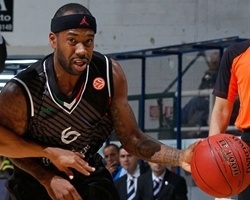 Bobby Brown tied the Euroleague single-game scoring record on Friday night with 41 points on the road against Fenerbahce Ulker.
Bobby Brown tied the Euroleague single-game scoring record on Friday night with 41 points on the road against Fenerbahce Ulker.
The Montepaschi Siena point guard entered into a four-way tie with Carlton Myers of PAF Bologna (2001), Kaspars Kambala of Efes Pilsen (2002), and the man for whom the yearly scoring title is now named, Alphonso Ford, who scored 41 in Peristeri’s 2001 playoff loss to a Fabricio Oberto-led Tau Ceramica club.
Brown’s final two points were partially picked cherries–a breakaway leak-away dunk as the time ran out on Siena’s 98-92 victory over Fenerbahce Ulker.
Here are the highlights from the 6’2″ guard out of Cal State Fullerton:
Cherry picking. Nitpicking. Whatever, since Siena walked away with their second Top 16 win. The last 40-point scorer in a Euroleague game was Marc Salyers in 2007, who also victimized Fenerbahce Ulker, but whose explosion was ultimately futile in a 97-90 regular season loss for Chorale Roanne.
As we’ve stated above, Ford’s 41 came in a loss, as did Kambala’s. Only Myers put his 41 toward a winning cause, a 98-80 playoff rout of Real Madrid. Myers and now Brown, that is.
Granted, 41 is not Wilt’s 100 (nor is it Jack Taylor’s 138). After all, the Euroleague plays 40-minute games on a narrower court. You can still hand check, a post defender can camp underneath the rim without penalty if he so pleases, and once a ball bounces on the rim, it’s yours for the swatting.
In short, the letter of the law leans less drastically toward the offense’s best interests in Europe than in the NBA.
Plus, the term ‘all-time’ should almost always come packaged in air quotes since Euroleague Basketball, as we know it today, came into its official trademarked existence with the start of the 2000-01 season. The ‘all-time’ clock has only been ticking for 12 seasons and change.
Yet even once you account for the disparities in the rules, lopping off 17 percent of the NBA’s game clock, and the Euroleague’s compressed eternity…41 points? Just 41?
Kyrie Irving had 41 less than a month ago. Ben Gordon’s gotten 40 in four different calendar years, including ’06, ’07, ’09 and a career-high 45 last season in his swan song with the Pistons. Jamal Crawford has scored 50 points three times, and with three different teams.
Hell, even Linas Kleiza had 41 points in January of 2008 with the Nuggets. And in 2009, with that fresh new bullet point on his NBA résumé, Kleiza signed in Piraeus, Greece and immediately led the Euroleague in scoring with Olympiacos and helped the Reds reach a Final Four.
Kleiza’s league-leading average that season: 17.1 points per game. His high was 26, which he registered twice.

I understand that, but it seemed like you were wondering why the Euroleague scoring record was so low as compared to the one in the NBA. That’s how it sounded. It’s actually a 1 point difference.
I hope you realize that just since 1991, these are the high scoring games in Euroleague:
Joe Arlauckas – 63 – 1995–96
Michael Young – 47 – 1993-94
Nikos Galis – 46 – 1991–92
Velimir Perasović – 45 – 1991–92
Ivica Žurić – 45 – 1993–94
Nikos Galis – 44 – 1991–92
Nikos Galis – 44 – 1991–92
Tony Dawson – 43 – 1996–97
Zdravko Radulović – 42 – 1991–92
Zdravko Radulović – 42 – 1991–92
İbrahim Kutluay – 41 – 1998–99
Alphonso Ford 41 – 2000–01
Carlton Myers – 41- 2000–01
Kaspars Kambala – 41 – 2002-03
Bobby Brown – 41 – 2012-13
And not to even mention how many guys scored higher than that before then.
Then of course there is the actual record of 99 points by the legendary Radivoj Korac, who had an entire European wide league named after him.
http://www.euroleague.net/features/voices/2010-2011/vladimir-stankovic/i/81292/5237/radivoj-korac-s-99-points
41 points is a long was from 63 points, just since how far back FIBA’s online record database goes. It’s not even in the same discussion with the all-time high off 99 points.
Hey AP. That’s why I put in this caveat:
Plus, the term ‘all-time’ should almost always come packaged in air quotes since Euroleague Basketball, as we know it today, came into its official trademarked existence with the start of the 2000-01 season. The ‘all-time’ clock has only been ticking for 12 seasons and change.\
I agree with you: we shouldn’t be fooled by the term all-time in this context. It’s only because the Euroleague broke off independently in 2000. Still, it’s the circumstances surrounding the accomplishment—Siena getting a second Top 16 win, and on the road, against the team that McCalebb and Andersen now play for and Pianigiani now coaches—that make it truly remarkable, and different from some of the other top scoring performances in the Euroleague this millennium.